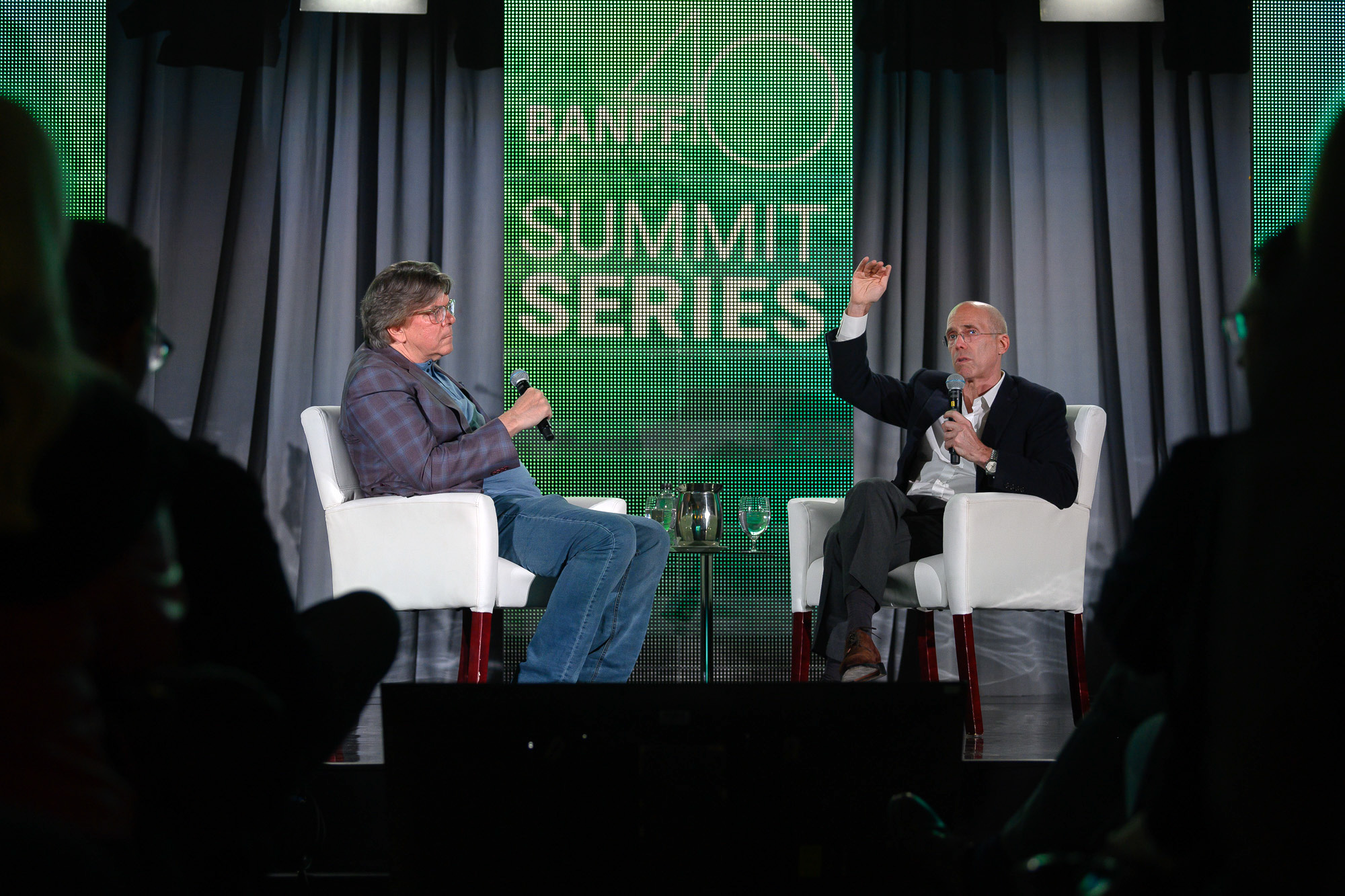Banff ’19: Quibi set for April 2020 launch in North America

As Jeffrey Katzenberg's premium short-form platform builds out a critical mass of content, there may be opportunities for Canadian content creators and producers.
Jeffrey Katzenberg’s Quibi is set to launch in North America on April 6, 2020, and as the premium short-form platform builds out a critical mass of content ahead of its debut, there may be opportunities for Canadian content creators and producers.
Industry mogul Katzenberg, who took part in a discussion with Bell Media president Randy Lennox at Banff World Media Festival on Sunday, said the platform would produce around 125 pieces of content each week and about 7,000 a year following its launch in Canada and the U.S.
Blue Ant Media is among the Canadian companies linked with potential Quibi originals. It has a short-form series, Doom Lands, in development with the platform through its in-house animation division Look Mom! Productions.
Quibi is one of a multitude of direct-to-consumer products bound for the Canadian market over the next year, with Apple and Disney both among those poised to launch SVOD services later in 2019. Bell Media president Randy Lennox says the media company estimates that by 2020 there will be 46 direct-to-consumer services available in the domestic market, up from around 25 currently.
But while Katzenberg agrees his service will compete with the more traditional SVOD players for attention, eyeballs and subscription revenues, Quibi is doing something very different, he insists.
“No one is doing what we’re doing today,” he said, adding that he believes Quibi will usher in the “third generation of film narrative.” (The first generation was the rise of film in the 1920s and the second was the rise of serialized, TV content). This third generation is a hybrid of the first two, says Katzenberg, whereby stories that are between two and fours hours total are broken up into chapters (each between seven and 10 minutes) that consumers can watch on the go. It’s an idea Katzenberg acknowledges has been done before, but never with the scope and budgetary firepower that Quibi promises.
The service is spending around USD $6 million for every hour of content, and in its first year will invest about USD $1 billion in content. The company is also putting a mammoth marketing push behind the launch of the platform and the serialized content it will house. According to Katzenberg, the company will invest a further USD $470 million on marketing in its first year.
Details about Quibi, which was cofounded by Katzenberg alongside Meg Whitman, have trickled out in recent months, with Steven Spielberg on Sunday becoming the latest high-profile name added to the list of collaborators. Spielberg will write and direct a horror project for the service called Spielberg After Dark. As per a request from the U.S. director, who only wanted people to watch it at night time, the “super scary story” will only be available after dark in each country where the service is available, says Katzenberg.
Previously announced projects include #Freerayshawn, a Sony TV project from Antoine Fuqua starring Canadian actor Stephan James and Laurence Fishburne.
Targeting a 25-to-35 year-old audience, Quibi will be available as a two-tiered service – an ad-free version for USD $7.99 and a version with short ads for USD $4.99. Pricing for the Canadian market has not yet been announced.
And while it will offer a unique proposition for consumers, Quibi offers an equally intriguing business model for creators and producers.
Under the deal structure, Quibi pays for 100% of the show, as well as additional costs to bring in bankable stars. Once filming is complete, two separate versions of the project are created in the editing suite. The first version is edited in such a way that it can be consumed in bite-size viewings. Quibi holds the exclusive rights to this version for seven years until the rights revert back to the creators and producers.
Meanwhile, each project is also edited as a feature film-style project. The rights for this version revert back to the creators and producers after just two years, after which time they are able to sell that long-form version of the project to international buyers. Katzenberg says this will be especially advantageous for creators, as the content will have benefited from Quibi’s major marketing push just two years earlier, giving the project built-in market recognition.
It’s something the major platforms and networks have already shown great interest in, says Katzenberg. “After we’ve marketed and promoted that, the value of [the projects] is going to be pretty extreme. Who is going to buy it? Apple, Amazon, Hulu, Netflix, HBO. The list is growing every day.”
The unique IP-ownership model could also prove to be a game-changing move in an industry that is increasingly seeing platforms control the rights to projects they commission, Katzenberg notes.
“These things have a giant upside. It’s the first time in my 40 years in the business in which we are making it possible for all creators and producers, and even the studios, to own their own IP.”
Katzenberg’s one-on-one discussion with Lennox was part of the Banff Summit Series, which will also include conversations with AMC Network Entertainment’s Sarah Barnett and PBS president and CEO Paula Kerger.
Photo credit: Kristian Bogner

 The definitive CDN broadcast and production resource.
The definitive CDN broadcast and production resource.










